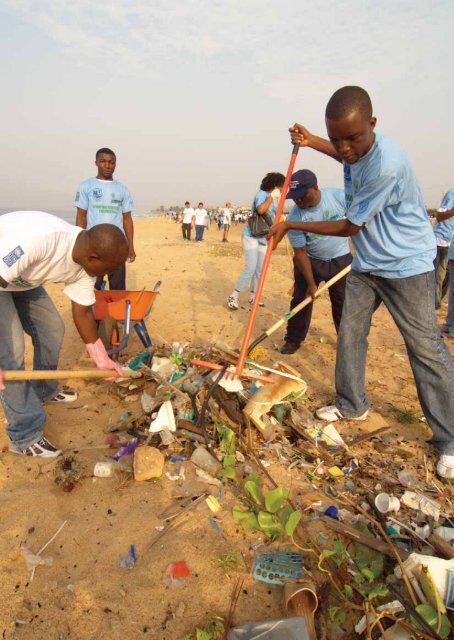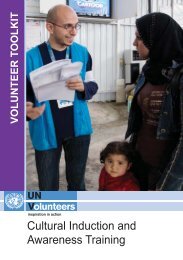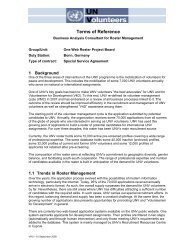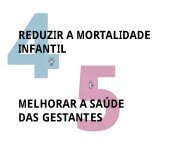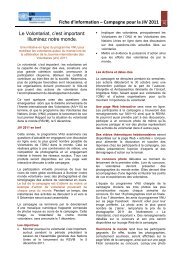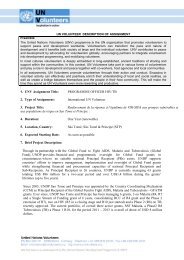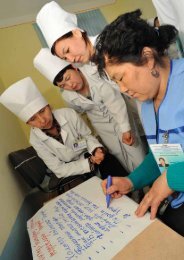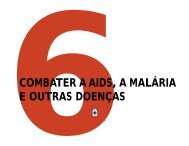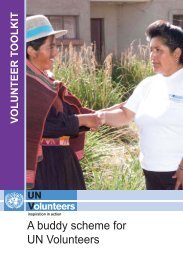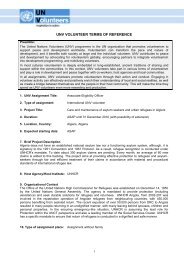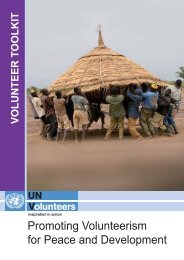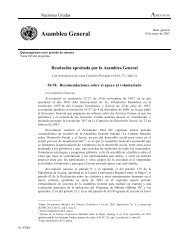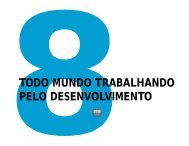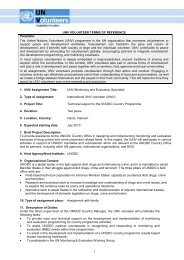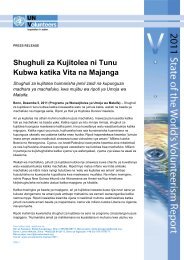1: Advocating change - United Nations Volunteers
1: Advocating change - United Nations Volunteers
1: Advocating change - United Nations Volunteers
You also want an ePaper? Increase the reach of your titles
YUMPU automatically turns print PDFs into web optimized ePapers that Google loves.
<strong>Advocating</strong><br />
Change<br />
“In our community, women are restricted from participating in public<br />
spheres due to cultural traditions. UNV is doing a great job, promoting<br />
gender equality and engaging youth, who now effectively advocate<br />
against gender-based violence in our community. We need to promote<br />
volunteerism and volunteers in order to facilitate <strong>change</strong> in our society.”<br />
Community member Junaid Ahmed, Pakistan<br />
Volunteerism engages communities and individuals in development efforts at the grassroots<br />
level. <strong>Volunteers</strong> raise awareness of the challenges we face and improve community access to<br />
information.<br />
UNV promotes global understanding and recognition of volunteerism as a means of enabling<br />
communities to contribute to peace and development in their immediate surroundings. UNV<br />
volunteers empower communities to make <strong>change</strong> happen, enhancing social cohesion and<br />
developing the capacities of communities and individuals.<br />
UNV volunteers are advocating <strong>change</strong> in the<br />
Asia-Pacific region, which has some of the<br />
highest reported levels of gender-based violence<br />
in the world. According to Oxfam International<br />
(2004), half the women in South Asia face<br />
violence at home; a World Health Organization<br />
(WHO) survey in 2005 revealed that 62 per cent<br />
of women in Bangladesh and 47 per cent in<br />
Thailand reported suffering sexual and/or<br />
physical violence.<br />
the programme addresses the root causes of<br />
gender-based violence and strives to create<br />
societies where this is unacceptable to all.<br />
Working with local partners, national UNV<br />
volunteers reach out to communities and<br />
mobilize community volunteers to address<br />
violence prevention. They also consolidate<br />
research, document volunteering contributions<br />
and support new studies to strengthen advocacy.<br />
UNV volunteers and<br />
volunteers from the UN<br />
Mission in Liberia, UN<br />
agencies and civil society<br />
clean up the beach in<br />
Monrovia, Liberia, on<br />
International Volunteer Day,<br />
5 December.<br />
(Philip Sen/UNV, 2009)<br />
UNV is partnering with the <strong>United</strong> <strong>Nations</strong><br />
Development Programme (UNDP), <strong>United</strong><br />
<strong>Nations</strong> Population Fund (UNFPA) and <strong>United</strong><br />
<strong>Nations</strong> Development Fund for Women (UNIFEM)<br />
in ‘Partners for Prevention’, a joint regional<br />
programme to reduce the prevalence of genderbased<br />
violence in 10 countries across the Asia-<br />
Pacific region (2008-2011). Focused on primary<br />
prevention – stopping violence before it starts –<br />
Rajeev Narayan is an Indian national UNV<br />
volunteer Network and Outreach Coordinator. He<br />
actively participates in violence prevention<br />
campaigns, mobilizes volunteers, documents<br />
case studies and shares good practices. Based at<br />
the Centre for Health and Social Justice in Delhi,<br />
he works with Men’s Action for Stopping<br />
Violence Against Women, a network of over 100<br />
organizations challenging gender stereotypes.<br />
ADVOCATING CHANGE | 7
Mainstreaming volunteerism in Sudan<br />
In Sudan, UNV engaged volunteers from<br />
within their own communities in tackling<br />
the culturally-sensitive issue of female<br />
genital mutilation (FGM), involving males<br />
and youth as well as women (community<br />
volunteer pictured above, photo: Blazej<br />
Mikula, 2008). National partners since<br />
2006 have included the Sudanese<br />
National Committee on the Eradication of<br />
Traditional Practices, the Sudanese<br />
Network for Abolition of FGM and the<br />
Ahfad University for Women.<br />
The project’s community-based<br />
approach to awareness-raising and peer<br />
education through volunteerism was key<br />
to its success, and FGM practice decreased<br />
notably in the targeted communities.<br />
To ensure sustainability, UNV helped<br />
establish the NGO Menath, through<br />
which local community members are<br />
now coordinating their activities. Since<br />
the pilot phase ended in 2009, UNFPA<br />
and the <strong>United</strong> <strong>Nations</strong> Children’s Fund<br />
(UNICEF) are replicating the communitybased<br />
volunteerism approach.<br />
“<strong>Volunteers</strong> focused on positive<br />
messages and engaged religious<br />
leaders, men and the younger<br />
generation in changing attitudes about<br />
what is considered a women’s issue,” says<br />
UNFPA Deputy Resident Representative<br />
Athanase Nzokirishaka. “UNFPA believes<br />
in innovation, and this emphasis on<br />
volunteering for social transformation<br />
opens the door to broader aspects of<br />
gender-based violence and new ways of<br />
empowering women and girls.”<br />
Ending Female Genital Mutilation<br />
(2009), a report of the UN Commission on<br />
the Status of Women, recognized that<br />
UNV and partners, “capitalized on<br />
volunteerism and local action to help<br />
combat female genital mutilation through<br />
awareness-raising and education”. The UN<br />
Evaluation Group is also using the project<br />
evaluation as a model for a handbook on<br />
integrating human rights and gender into<br />
evaluation processes.<br />
“This volunteer-driven movement works with a<br />
chain of volunteers taking responsibility at the<br />
individual level and in each district,” Rajeev<br />
explains. “We count on these men and prepare<br />
them for future leadership roles. I have also been<br />
assisting young people in monitoring their own<br />
gender behaviour. A tremendous <strong>change</strong> that I<br />
“Linking masculinity, patriarchy and gender-based violence<br />
is a new approach... and volunteers from within this culture<br />
are key to sensitizing men and boys on gender equality and<br />
issues of violence against children and women.”<br />
have witnessed is that youth have started<br />
engaging in non-traditional roles like assisting<br />
their sisters and mothers with housework.”<br />
Rajeev’s counterpart in Pakistan, Rizwan Latif, is a<br />
national UNV volunteer Outreach and Capacity<br />
Development Officer serving with Rozan, an<br />
Islamabad-based NGO working on emotional<br />
health, gender and violence.<br />
“At Rozan, I work on the Humqadam (Working<br />
Together) project, an initiative to involve males<br />
in addressing gender-based violence,” he says.<br />
8 | UNITED NATIONS VOLUNTEERS: ANNUAL REPORT 2009
“I facilitate awareness-raising sessions at the<br />
community level aimed at initiating and<br />
sustaining a <strong>change</strong> in attitudes of males about<br />
themselves and their role in society. Linking<br />
masculinity, patriarchy and gender-based<br />
violence is a new approach in the Pakistani<br />
context, and volunteers from within this culture<br />
are key to sensitizing men and boys on gender<br />
equality and issues of violence against children<br />
and women”.<br />
The work Rizwan and Rajeev do is not without its<br />
challenges. Rizwan acknowledges the difficulty<br />
inherent in changing mindsets. “It is great to<br />
fight for a cause and involve individuals and<br />
groups to bring about <strong>change</strong> in society.” Rajeev<br />
says, “I have been able to gain strength, courage<br />
and confidence through a clear-cut message:<br />
‘Not all men are violent’.”<br />
In Morocco, UNV is working with UNDP and the<br />
Government to raise awareness of women’s rights<br />
and ensure that gender issues are considered in<br />
all development programmes. UNDP has<br />
developed an approach linking so-called ‘gender<br />
mainstreaming theory’ with day-to-day realities<br />
faced in project activities. Six national UNV<br />
volunteers were fielded as the ‘gender-sensitive<br />
eyes and ears’ of six pilot projects after receiving<br />
training in gender concepts, analysis and<br />
reporting through a national NGO, the Institute<br />
for Training of Development Workers.<br />
Fouzia Chkar and Hasnaa Fassah were placed in<br />
projects in their home regions. Fouzia served<br />
with a project for the Integrated Management of<br />
Forests of the Middle Atlas, Hasnaa with a Civil<br />
Society Support Programme designed to<br />
develop and strengthen the capacity of<br />
Moroccan civil society organizations.<br />
Fouzia and Hasnaa had a common<br />
understanding of their challenging task.<br />
“We had a huge mission ahead of us,” Fouzia says.<br />
“On the one hand we had to be consensual and<br />
convincing while challenging gender relations<br />
within the project team and among beneficiaries<br />
in general. On the other hand, we had to support<br />
the teams with results-based reporting. We<br />
wondered at the beginning: Would they like us?<br />
Would they take us seriously? Would our work<br />
have any results in terms of gender and women’s<br />
empowerment?”<br />
The national UNV volunteers engaged both men<br />
and women in project activities, calling for an<br />
improvement in the status and involvement of<br />
women in the communities they worked with.<br />
Acting as ‘gender experts’, they raised awareness,<br />
challenged stereotypes and identified<br />
opportunities to tackle gender inequalities.<br />
Communities reacted positively to the incomegenerating<br />
activities the volunteers put in place<br />
and the cooperatives they created to influence<br />
the socio-economic status of women.<br />
National UNV volunteer<br />
Rajeev Narayan (centre right)<br />
discusses gender equality<br />
and male stereotypes in<br />
Uttar Pradesh, India,<br />
together with community<br />
member Sachita Mishra (in<br />
red) and Ram Prakash<br />
Pandey (in light blue), from<br />
partner organization Tarun<br />
Chetna. (Anil Tharayath<br />
Varghese/UNV/UNDP, 2009)
Natalia Gozak (right), a<br />
national UNV volunteer<br />
E-communities Assistant,<br />
and Intel Facilitator Inna<br />
Mishurniayeva, train pupils<br />
in Kiev, Ukraine, to develop<br />
projects benefitting their<br />
local community with the<br />
help of the ‘Skills for Success’<br />
programme. (Vladimir<br />
Negrebezkij, 2010)<br />
The UNV volunteers ensured local ownership and<br />
thus the sustainability of the gender-sensitive<br />
approach by involving women in the management<br />
of the project. Hasnaa reports, “Women were<br />
thanking us for our contribution, telling us that<br />
they now had more respect because they had<br />
more knowledge and experience.”<br />
“The communities I visited had severe challenges in all<br />
areas of development. Voluntary service allowed us to take<br />
action and this was rewarding. Ultimately, we can all make<br />
<strong>change</strong> happen.”<br />
Fouzia felt personally enriched and empowered<br />
by her volunteer experience. “The communities<br />
I visited had severe challenges in all areas of<br />
development,” she says. “Voluntary service<br />
allowed us to take action and this was rewarding.<br />
Ultimately, we can all make <strong>change</strong> happen.”<br />
There is a great need for substantial progress<br />
towards the Millennium Development Goals<br />
(MDGs) in Africa. In Senegal, for example, the<br />
majority of its estimated 12 million people,<br />
especially those in rural areas, live at or near<br />
poverty levels. The UNDP Human Development<br />
Index 2009 ranks the country 166 th out of 182<br />
nations in the world in terms of the overall<br />
wellbeing of its population.<br />
Keen to involve citizens in development, the<br />
Government is in the process of approving a<br />
legal framework regulating volunteerism and<br />
volunteer deployment. A UNV-supported<br />
study identified the need for coordination<br />
and project management skills among<br />
volunteer-involving organizations in Senegal,<br />
so UNV and UNDP are helping strengthen<br />
their ability to leverage the power of<br />
volunteerism for development.<br />
Nine UNV volunteers work with 23 community<br />
grassroots organizations, providing training on<br />
the MDGs, volunteer management, project<br />
development, and monitoring and evaluation.<br />
They helped establish La Maison des Volontaires<br />
(House of <strong>Volunteers</strong>), a service centre to match<br />
potential volunteers with organizations in need<br />
of their services, and three satellite offices. The<br />
volunteers participated in an ex<strong>change</strong> visit with<br />
the national volunteer programme in Burkina<br />
Faso, learning from experiences there and<br />
fostering South-South cooperation.<br />
Within the framework of the project, 1,790<br />
community volunteers are sensitizing<br />
communities on the MDGs, disseminating<br />
information materials in local languages and<br />
sharing knowledge via local radio. By raising<br />
10 | UNITED NATIONS VOLUNTEERS: ANNUAL REPORT 2009
awareness of issues like education and gender<br />
equality, they contribute to changing attitudes<br />
towards the enrolment of children in school or<br />
the role of women.<br />
The UNV/UNDP project also provides small grants<br />
to fund community volunteering initiatives. In the<br />
city of Ziguinchor, ‘third age’ volunteers, retired<br />
professionals with backgrounds in education,<br />
took the initiative to address the needs of their<br />
community and volunteered to tutor primary<br />
school children after school, benefitting 351 girls<br />
and 356 boys. Enjoying the chance to contribute<br />
as a volunteer, one of them said, “It is better to be<br />
used up in action than to rust in inactivity”.<br />
<strong>Advocating</strong> <strong>change</strong> requires the expertise and<br />
participation of all development partners,<br />
including the private sector. In the Ukraine, UNV,<br />
UNDP and the Government are working with the<br />
technology corporation Intel to engage young<br />
people and enhance their skills for the job<br />
market.<br />
The Youth Social Inclusion for Civic Engagement<br />
project develops the capacity of youth centres,<br />
empowering the marginalized from urban and<br />
rural areas to take part in society through training<br />
and voluntary action. Running from 2008 to 2011,<br />
the project is integrating volunteerism across its<br />
activities, with the youth themselves planning<br />
and organizing initiatives such as awarenessraising<br />
campaigns on the environment.<br />
Ten national UNV volunteers coordinate the<br />
project, which supports 40 youth centres<br />
established by UNDP, and has reached over 3,000<br />
community members. UNV volunteers trained<br />
young leaders in project management and team<br />
building as well as in how to run art, technology<br />
and ecological activities.<br />
One activity conducted by the UNV volunteers<br />
was educational geocaching, a high-tech team<br />
game based on finding hidden items (caches)<br />
using geographical coordinates and GPS devices.<br />
From July to October 2009, 512 youth took part in<br />
geocaching quests organized with the guidance<br />
of UNV volunteers.<br />
These activities promoted interaction and<br />
developed a feeling of social responsibility. “In<br />
Pryvorottya, there was a girl with health disorders<br />
on our team and one boy kept cheering her on<br />
every time she dropped behind,” says national<br />
UNV volunteer Tamara Repyova. “Success<br />
Enhancing trust and inclusion<br />
in Guyana<br />
One of the poorest countries in the Americas, Guyana struggles with<br />
an often delicate political and security climate, caused, in part, by<br />
social tensions between ethnic groups.<br />
UNV is working with UNDP and the Government on the Enhanced<br />
Public Trust, Security and Inclusion project to strengthen democratic<br />
practices and sustainable peace. The project aims to empower 100<br />
young people, aged 18 to 25, to serve as Community Youth Facilitators<br />
through the national UNV volunteer programme launched in 2009.<br />
UN Resident Coordinator and UNDP Resident Representative Kiari<br />
Liman-Tinguiri describes the programme as innovative, noting the<br />
large numbers of national UNV volunteers. “This is something Guyana<br />
should be proud of and the young volunteers congratulated on,” he<br />
says. “The volunteers come from diverse backgrounds but they all have<br />
one thing in common, the desire and potential to be agents for<br />
peaceful <strong>change</strong> at the community level.”<br />
To date, about 50 national UNV volunteer Community Youth<br />
Facilitators are serving within their own communities. The volunteers<br />
receive training in democratic governance, community mobilization,<br />
conflict transformation, facilitation and life skills to prepare them for<br />
their assignments. They reduce risk by enhancing community<br />
dialogue, advocating non-violence and engaging youth in the<br />
constructive resolution of conflicts. One of these, Leon Niles, is<br />
pictured above (centre) conducting literacy classes in Georgetown<br />
(Calvin Bradford, 2010).<br />
UNV volunteer Keeran Williams, a Regional Coordinator in Linden,<br />
explains, “I work on a one-on-one basis with these youth, which is a<br />
privilege: showing them it’s okay to dream, to want more, and to do<br />
more. Having come from a poor background myself, with a father who<br />
abused alcohol, I provide inspiration to these youth,” Keeran continues.<br />
“I’m really appreciative to UNV: youth are actually involved in this<br />
programme, not just sitting in meetings.”<br />
Jean Wintz, a UNV volunteer Community Facilitator in Georgetown,<br />
agrees. “This project is making an impact,” she says. “When we first<br />
came to this neighbourhood, there were fights every day – that’s no<br />
exaggeration! But the <strong>change</strong> is being felt: our monitoring shows that<br />
school attendance is up, behaviour is changing, and participation is<br />
improving. We’re training children and youth to be volunteer leaders<br />
and set examples, even after we’re gone.”<br />
INTEGRATING SUSTAINABILITY | 11
Fatou Diallo (left) is a<br />
member of the Unité de<br />
transformation et de<br />
production des céréales<br />
locales Seddo Ndam (Seddo<br />
Ndam Local Cereal<br />
Processing and Production<br />
Unit). Here, she shows cereal<br />
products to national UNV<br />
volunteer Aminata Diagne<br />
Barre. UNV volunteers<br />
manage the daily operations<br />
of the project.<br />
(Harald Franzen, 2010)<br />
depends on the contribution of each participant.<br />
The teams have to cooperate since each member<br />
has different qualities, from knowledge of the<br />
site to imagination, physical strength and<br />
endurance. No matter how the quest finished,<br />
teams worked together and this positively<br />
influenced their collaboration afterwards.”<br />
In Brazil, UNV is supporting UNDP in preparing<br />
the next National Human Development Report<br />
(NHDR), which started with a national<br />
consultation to define its theme. UNV/UNDP<br />
engaged in a project with five Brazilian<br />
universities called ‘Brazil Point by Point’, which<br />
mobilized 160 local volunteers. The volunteers<br />
surveyed more than half a million people, who<br />
reported that they considered values such as<br />
responsibility, respect, love and reciprocity<br />
essential for a better life. As a result, UNDP chose<br />
the theme ‘Guiding Values for Life’ for the report.<br />
A total of 40 national UNV volunteers were<br />
engaged in the elaboration of the NHDR and<br />
collected primary data for the creation of a new<br />
indicator, the ‘Human Value Index’. The UNV<br />
volunteers were scattered across Brazil, and<br />
interviewed 6,000 people on human values,<br />
education, violence and demographic variables.<br />
Subsequently, they assessed and compiled the<br />
data for statistical analysis.<br />
Flávio Comim is the Coordinator of the National<br />
Human Development Report at UNDP. He<br />
explains, “Rather than paying a private company<br />
to do the job, we took on organizing the logistics<br />
of a very complex survey ourselves. But the<br />
returns were priceless. The UNV volunteers<br />
reported a rich array of experiences that called<br />
their attention to human suffering and hardship<br />
co-existing with happiness, friendship and<br />
human solidarity all over the country.”<br />
“The UNV volunteers reported a rich array of experiences<br />
that called their attention to human suffering and hardship<br />
co-existing with happiness, friendship and human solidarity<br />
all over the country.”<br />
UNV works with UN partners in developing<br />
countries around the world to advance the<br />
development agenda, advocating for more<br />
participation and engagement. UNV supports<br />
the UN ‘Delivering as One’ (‘One UN’) initiative by<br />
integrating volunteerism for development in<br />
eight pilot countries: Albania, Cape Verde,<br />
12 | UNITED NATIONS VOLUNTEERS: ANNUAL REPORT 2009
Mozambique, Pakistan, Rwanda, Tanzania,<br />
Uruguay and Viet Nam. In Uruguay, UNV forged<br />
strong alliances to strengthen civil society, and is<br />
supporting the Government in planning for a<br />
national youth volunteer programme.<br />
Matías Rodríguez, Director of the National Youth<br />
Institute at the Social Development Ministry,<br />
explains, “UNV has helped the National Youth<br />
Institute to define its role in promoting<br />
volunteerism. UNV conducted a survey on<br />
volunteerism that facilitated decision-making<br />
regarding policies for the promotion, recognition<br />
and establishment of a legal framework for<br />
volunteerism in the country”.<br />
“In 2009, we launched a national roundtable on<br />
volunteerism with the full involvement of a<br />
range of actors, from UN agencies, a network of<br />
public institutions, corporations, civil society<br />
organizations, public and private universities and<br />
city mayors,” says UNV volunteer Antonio<br />
Graziano (Italy). UNV also partnered with Civicus:<br />
World Alliance for Civic Participation on a<br />
national study of volunteerism in 2009, which<br />
revealed that around 20 per cent of Uruguayans<br />
had volunteered in some way, making an<br />
economic contribution equivalent in value to<br />
about US $145 million or one percent of the<br />
gross domestic product.<br />
In Viet Nam, UNV is also working through the<br />
One UN programme to strengthen the capacity<br />
of volunteerism for development, promote the<br />
greater involvement of people living with<br />
HIV/AIDS and ensure that gender issues are<br />
reflected in development.<br />
The Government has a strong commitment to<br />
gender equality, and the gender gap in<br />
education and the workforce is narrowing.<br />
However, traditional attitudes persist, particularly<br />
among the rural poor. Tanja Noponen (Finland) is<br />
a UNV volunteer Gender Specialist who ensures<br />
that women's issues are taken into account in<br />
development programming. “Projects cannot<br />
meet their goals efficiently if there is no<br />
consideration of the different effects on men and<br />
women,” she says.<br />
“Climate <strong>change</strong> will affect agricultural and<br />
ecological systems,” Tanja explains. “Because<br />
women in Viet Nam depend on natural resources<br />
for their livelihoods, they are more vulnerable to<br />
resource scarcity and the impacts of natural<br />
disasters. Therefore, gender is a key factor in<br />
considering ways to adapt to climate <strong>change</strong>.”<br />
Meet UNV volunteers...<br />
recognized for outstanding<br />
service<br />
UNV advocates for recognition of the dedication and contribution of<br />
volunteers to development. Every year, UNV volunteers around the<br />
world receive awards, symbolizing the appreciation of the partners<br />
they work with.<br />
In China, national UNV volunteer Liu Hui, a Communications Officer at<br />
the Beijing <strong>Volunteers</strong> Association, volunteered to provide logistical<br />
support for a team of doctors in the immediate aftermath of the May 2008<br />
Sichuan earthquake (Liu Hui pictured above, photo: Gao Wei /UNV, 2008).<br />
In 2009, she received an award as one of the ‘Beijing Top Ten <strong>Volunteers</strong>’.<br />
Another national UNV volunteer, Canaria Gaffar, was recognized for her<br />
work on HIV/AIDS with Aids Care China and named 'Outstanding National<br />
Volunteer of 2009'. UNV and UNDP received the ‘National Brand [Model]<br />
Project of the Year 2009’ award in China, recognizing cooperation on an<br />
Early Recovery and Disaster Risk Management project.<br />
Linda Germanis (Italy), a UNV volunteer with the <strong>United</strong> <strong>Nations</strong><br />
Educational, Scientific and Cultural Organization (UNESCO), was<br />
named ‘Outstanding Volunteer’ in Thailand. She received the award<br />
from Mr Issara Somchai, Minister of Social Development and Human<br />
Security, for her work with a volunteer project that helps marginalized<br />
people document their lives through photography.<br />
Clement Dubarry (France) and Ana Nunes (Portugal), UNV<br />
volunteers with the Office of the <strong>United</strong> <strong>Nations</strong> High Commissioner<br />
for Refugees (UNHCR) in Jordan, received awards from Princess Basma<br />
Bint Talal for their work with refugees. During a celebration at the<br />
Princess Basma Youth Resource Center they highlighted the valuable<br />
contributions of volunteers to development.<br />
Force Commander Lt. Gen. Babacar Gaye of the <strong>United</strong> <strong>Nations</strong><br />
Mission in the Democratic Republic of Congo (MONUC) recognized<br />
UNV volunteers William Mulongo (Kenya) and Makhtar Ba (Senegal).<br />
Working with movement control operations, they had handled loading<br />
and off-loading cargo from seven flights a day for four weeks under<br />
harsh conditions, including 211 metric tons of incoming cargo.<br />
UNV volunteer Rukaya Mohammed (Ghana) received the Creativity<br />
and Innovation Award from UNDP Liberia for raising the profile of the<br />
UNV country office.<br />
In Burkina Faso, 79 volunteer teachers working in primary schools<br />
received certificates recognizing their service within the context of the<br />
National Volunteer Programme from UNDP Country Director Ruby<br />
Sandhu-Rojon.<br />
ADVOCATING CHANGE | 13
Advocacy in action<br />
“The decisions and actions of individuals may seem insignificant in the face of global challenges.<br />
But when people choose to devote their time and energy they can, together, make a difference.”<br />
UN Secretary-General Ban Ki-moon, International Volunteer Day 2009<br />
UNV advocates for volunteerism, inspired<br />
by the conviction that every individual<br />
can contribute skills and knowledge to<br />
advance human development. Every<br />
year, on International Volunteer Day<br />
(IVD), 5 December, we recognize the<br />
contributions of volunteers reaching<br />
out to governments, civil society,<br />
development and private sector<br />
partners, and communities all over<br />
the world.<br />
With the eyes of the world focused<br />
on the <strong>United</strong> <strong>Nations</strong> Climate Change<br />
Conference in Copenhagen, the ‘Seal the<br />
Deal’ campaign of the <strong>United</strong> <strong>Nations</strong><br />
Environment Programme (UNEP) aimed<br />
to galvanize public support and bring<br />
the voices of the people to the leaders.<br />
UNV launched a theme-based campaign<br />
for IVD 2009, ‘Volunteering for our<br />
Planet’, which sought to illustrate<br />
environmental action already being<br />
taken by volunteers around the world.<br />
An interactive page hosted on the<br />
Seal the Deal website registered more<br />
than 1.5 million hours volunteered for the<br />
planet between World Environment Day<br />
(5 June) and IVD. The highest numbers of<br />
volunteers registered were from<br />
developing countries, including India,<br />
Ecuador, Kenya, Pakistan and Nigeria.<br />
Actions being taken indicated a<br />
heightened awareness of climate <strong>change</strong><br />
challenges within developing countries,<br />
as well as a determination to take practical<br />
steps to address them.<br />
<strong>Volunteers</strong> reclaimed the beaches and<br />
coastal cities of West Africa, with<br />
thousands of local people allying with<br />
UNV volunteers, UN personnel and<br />
authorities in cleanup activities in<br />
Conakry, Freetown, Monrovia, Abidjan<br />
and Accra. In Zimbabwe, UNV supported a<br />
national tree planting day at the<br />
International Friendship Forest, launching<br />
the wider Harare Greening Project which<br />
aims to plant two million trees by 2015.<br />
<strong>Volunteers</strong> in Honduras mopped up<br />
the docks at Puerto Lempira, set up waste<br />
containers, and raised awareness about<br />
the importance of recycling. The Peace<br />
Corps, the Japan International<br />
Cooperation Agency and UNV joined<br />
together in Kyrgyzstan to study and<br />
construct solar barrel heaters which they<br />
distributed as sources of clean energy for<br />
rural people. Assisted by UNV, the Muslim<br />
Scouts of Algiers cleaned up a forest,<br />
collecting two truckloads full of refuse.<br />
Though International Volunteer Day<br />
happens just once a year, it aims to<br />
create a lasting impression of the impact<br />
of volunteerism. Among the legacies of<br />
the UNV ‘Volunteering for our Planet’<br />
campaign was the creation of an online<br />
community that has become selfsustaining<br />
as volunteers contribute their<br />
thoughts and evidence of their actions<br />
to improve the environment through<br />
volunteerism around the world.<br />
The General Assembly,<br />
Invites Governments to observe<br />
annually, on 5 December, an<br />
International Volunteer Day for<br />
Economic and Social Development,<br />
and urges them to take measures to<br />
heighten awareness of the important<br />
contribution of volunteer service,<br />
thereby stimulating more people in all<br />
walks of life to offer their services as<br />
volunteers, both at home and abroad...<br />
A/RES/40/212. International Volunteer Day<br />
for Economic and Social Development<br />
(17 December 1985)<br />
‘Volunteering for our Planet’ highlighted the<br />
grassroots commitment to environmental<br />
voluntary action. The 1.5 million hours registered<br />
sent a strong message to delegates at the 2009 UN<br />
Climate Change Conference. Participants also<br />
demonstrated their support at the UNV booth in<br />
Copenhagen. (Scott McQuade/UNV, 2009)<br />
14 | UNITED NATIONS VOLUNTEERS: ANNUAL REPORT 2009
Marking the tenth anniversary of<br />
the International Year of <strong>Volunteers</strong><br />
“We engage the will, the positive energy and the innovation of millions of people towards realizing the<br />
Millennium Development Goals and in building social cohesion, mutual understanding and the<br />
achievement of community-centred goals.”<br />
Extract from the vision statement for the tenth anniversary of the International Year of <strong>Volunteers</strong><br />
The International Year of <strong>Volunteers</strong> in<br />
2001 put volunteerism for peace and<br />
development on the international<br />
agenda like never before. Its tenth<br />
anniversary in 2011 is another unique<br />
opportunity to celebrate the impact<br />
that volunteers and voluntary action<br />
have around the world.<br />
Activities under consideration for<br />
the year 2011 promise to showcase the<br />
diversity, breadth and depth of<br />
volunteering. The anniversary offers a<br />
renewed chance to truly raise the profile<br />
of volunteerism for peace and<br />
development, and to mobilize a<br />
constellation of volunteers from all<br />
backgrounds and nationalities. Once<br />
again, the <strong>United</strong> <strong>Nations</strong> General<br />
Assembly nominated UNV to be the<br />
focal point to coordinate a common<br />
approach, and in October 2009, UNV<br />
brought together stakeholders from<br />
across the UN and civil society for a<br />
consultative meeting at its<br />
headquarters in Bonn.<br />
The gathering resulted in a global<br />
plan of action for the tenth anniversary<br />
of the International Year of <strong>Volunteers</strong><br />
(‘IYV+10’), including a vision statement<br />
and an invitation to join the<br />
celebrations. This global call to action<br />
encourages stakeholders to reinvigorate<br />
the spirit of the International Year of<br />
<strong>Volunteers</strong> and its four pillars:<br />
recognition of the contributions of<br />
volunteers; understanding of how<br />
volunteerism can <strong>change</strong> the pace and<br />
nature of development; continued<br />
advocacy and policy development; and<br />
enhanced cooperation among<br />
volunteer-involving organizations.<br />
Stakeholders are responding. In<br />
Namibia, a Volunteerism for Development<br />
Coordinating Committee is spearheading<br />
national volunteerism policy<br />
development and plans to commemorate<br />
IYV+10. The International Federation of<br />
the Red Cross and Red Crescent Societies<br />
has established a senior management<br />
steering committee to oversee its<br />
involvement in IYV+10 at the global level<br />
and to facilitate national campaigns.<br />
The year 2011 also promises close<br />
synergies with the International Year of<br />
Youth, which begins on 12 August 2010,<br />
and the European Year of Volunteering<br />
designated for 2011 by the European<br />
Commission. Planning is underway on<br />
joint activities between UNV and the<br />
European Commission, such as a<br />
regional conference on volunteerism for<br />
the MDGs.<br />
UNV and its partners will<br />
continue to use the World<br />
Volunteer Web as the main<br />
platform to facilitate<br />
collaboration and make<br />
information on volunteerism<br />
more accessible to all.<br />
Information related to the<br />
marking of IYV+10 is also<br />
available on this portal<br />
(www.worldvolunteerweb.org).<br />
The General Assembly,<br />
Invites Governments, with the active<br />
support of the media, civil society and<br />
the private sector, as well as<br />
development partners and the<br />
relevant organizations and bodies of<br />
the <strong>United</strong> <strong>Nations</strong> system, to carry<br />
out activities focused on marking the<br />
tenth anniversary of the International<br />
Year, in 2011, at the regional and<br />
national levels...<br />
A/RES/63/153. Follow-up to the<br />
implementation of the International Year<br />
of <strong>Volunteers</strong> (18 December 2008)<br />
ADVOCATING CHANGE | 15


